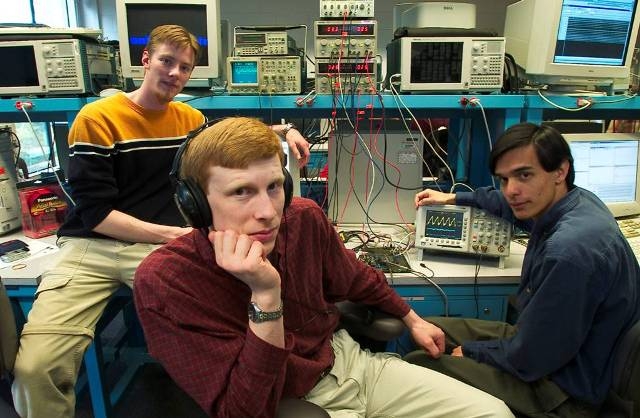|
Considering Life Cycle During Design: A Longitudinal Study of Engineering Undergraduates.
(ASEE 2009)
The findings from this study provide a baseline assessment of how broadly engineering undergraduates approach design
with respect to life cycle considerations.
Read the brief >
From Beginning to End: How Engineering Students Think and Talk About Sustainability
Across the Life Cycle. (Mudd Design Workshop 2009)
Engineering educators and program planners should work not only to make sustainability explicit in engineering
curricula, but also to provide opportunities for students to develop self-directed learning and critical reflection
skills.
Read the brief >
Characterizing Design Learning Through the Use of Language: A Mixed-methods Study of
Engineering Designers. (Journal of Engineering Education 2008)
As a result of taking a course in engineering design and/or studying engineering for four years, students acquire
engineering design language that is common to a larger community of practice...
Read the brief >
Trajectories of Knowledge and Action in Becoming an Engineer. (Sociolinguistic Symposium
2008)
The kind of language that makes up the life worlds and social spaces of engineers, what is referred to in this paper
as talk-engineering, has enabled researchers to perceive how engineering students construct their own figured worlds.
Read the brief >
A Qualitative Study of the Early Work Experiences of Recent Graduates in Engineering.
(ASEE 2008)
The social and organizational contexts within which newly hired engineers worked influenced the problems and
processes they experienced--often introducing greater complexity, ambiguity, and subjectivity than expected.
Read the brief >
Moving From Pipeline Thinking to Understanding Pathways: Findings from the Academic
Pathways Study of Engineering Undergraduates. (ASEE 2008)
Overall, the preliminary APS findings indicate a large variation in student pathways and institutional influences.
Read the brief >
Will I Succeed in Engineering? Using Expectancy-value Theory in a Longitudinal
Investigation of Students' Beliefs. (ASEE 2008)
The data demonstrate that students who lack confidence in skills they perceive to be important to successful engineers
can still have a positive expectancy of success in engineering.
Read the brief >
Competition, Confidence, and Challenges in the Engineering Classroom: American and International
Students Speak Out. (ASEE 2007)
International engineering students exhibited a higher level of confidence in the areas of mathematics, science, and in
themselves than American students at one university.
Read the brief >
Creative, Contextual, and Engaged: Are Women the Engineers of 2020? (ASEE 2007)
Women in this study defined engineering, approached engineering problems, and engaged in their overall engineering
education more broadly than men. Read the brief >
Breadth in Design Problem Scoping: Using Insights From Experts to Investigate Student
Processes. (ASEE 2007)
By describing both novice and expert approaches to engineering design, researchers are contributing to the formulation
of more specific design learning outcomes that may be addressed in curriculum design and program planning.
Read the brief >
Considering Context: A Study of First-Year Engineering Students. (ICREE 2007)
During problem scoping of two design tasks, women's responses were more likely to be context-oriented than men's.
Read the brief >
Identifying and Investigating Difficult Concepts in Engineering Mechanics and Electric
Circuits. (ASEE 2006)
Interviewees used language suggesting they viewed fundamental concepts like “force” and “voltage” as substances
when in fact they are processes or interactions.
Read the brief >
What Brings Women to the Table? Female and Male Students' Perceptions of Ways of Thinking in
Engineering Study and Practice. (FIE 2006)
Academic Pathways Study results suggest that regardless of gender, students view math, science, and other technical
abilities as foundational in engineering. The findings also provide a complex picture of gender differences in the
experiences and ways of thinking that beginning undergraduates associate with engineering.
Read the brief >
|
